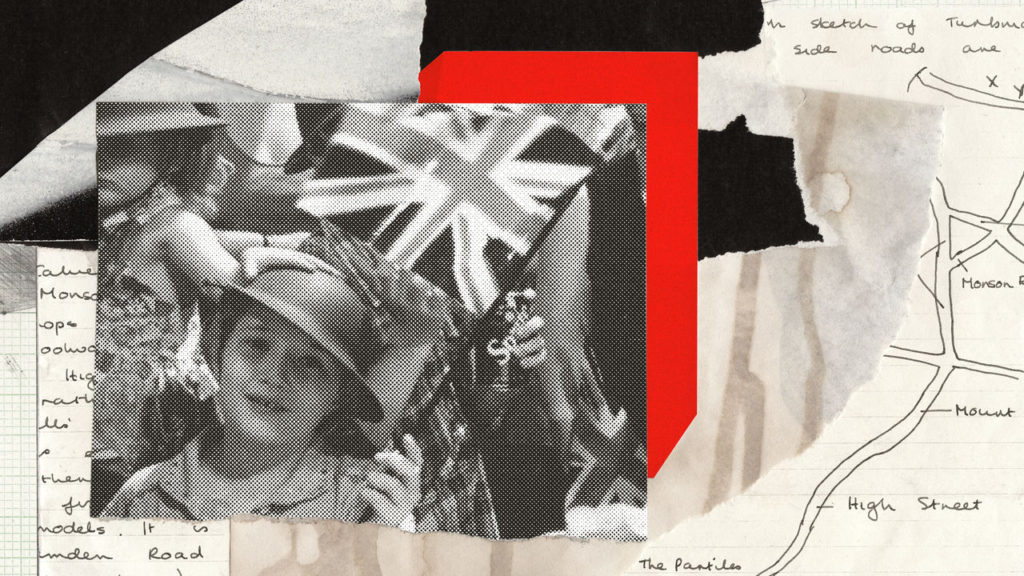BRIGHTON — THE LETERS came every day. Sometimes a dozen, often more. The librarians of the University of Sussex were accustomed to a steady trickle of outside interest: they were the keepers of Virginia Woolf’s papers and Rudyard Kipling’s. But suddenly, in the early summer of 1981, the post bags bulged. They all ended up in one room of the library, where mounds of correspondence already teetered on every surface. And still more turned up. At Christmas, cards arrived, scores of them.
The postmarks fitted no pattern: one day London, then Loughton; Lowestoft and Liverpool; Weybridge and Whitby. Someone wrote from Kirkwall, the main town on Orkney—25 miles off the north coast of Scotland. The correspondents were all anxious to reach one man, no matter that he only popped into the library for an hour or two each week to paw through the choicest epistles. “Dear Professor Pocock,” one neatly typed missive opened. Another struck a more informal tone: “Hi professor”.
The professor in question, David Pocock, was not an obvious tribune of the masses. Sharp and sharp-tongued, a product of Cambridge and Oxford, he was by then in his fifties and lived alone with his cat. He had made his career studying Gujarati society and his reputation on campus as the host of gatherings for faculty and the brightest students. For his “black party”, he covered the walls in crepe paper and served only black velvet (Guinness and champagne) and caviar.
The lives of his letter-writers were rather different. One was a nursery nurse from Rochdale in her early 30s; another a retired bus driver. There was a carpenter from Cardiff, a housewife from Great Yarmouth and a retired travel agent’s clerk from Orpington. Eric Allison, a career burglar with a knack for relieving country houses of their silver, wrote from prison in Manchester, first on the topic of vegetarianism. Pocock was impressed. “I don’t say this to all the girls,” he wrote a little later in their correspondence, “but you can write.”
And so began one of the most eccentric, yet enduring, attempts at preserving for posterity the lives and views of everyday folk: the Mass Observation Project. Announcing the plan in a letter to New Society, then a British periodical, in June 1981, Pocock explained that he was seeking correspondents from any walk of life: the more humdrum, the better. “All that is required is a willingness to write to us both about personal experience and things seen and heard in daily life,” he explained. “The more ‘ordinary’ people think they are, the more interesting their experience to us.”
getting to know all about you
It was not the first such attempt. Pocock borrowed the idea and the name from a study that began in 1936 whose founders grandly claimed to be pioneering “the science of ourselves”. Those original “Observers”, as they referred to themselves, cast a quantitative eye over every aspect of life, sometimes in rather eccentric detail (on average, one Observer noted, it took a drinker seven minutes and three seconds to finish his pint in a pub in Brighton; pints were downed fastest on Fridays but nursed on Tuesday evenings). Of greater use to historians were the diaries Observers kept of life on the home front during the second world war.
That project petered out in peacetime, but its archives eventually wound up at Sussex with Pocock. For his new Mass Observation he decided to survey his panel quarterly, tracking in microcosm the effects of political, social and economic change. “Assume nothing is too obvious,” he wrote in a covering letter to his inaugural “directive”, as he called each appeal for contributions. “Think of yourself as describing something of which the reader has no experience. Concentrate as if bird-watching. Learn to look.”
Even Pocock’s rather dry choice of initial subject—a three-year study of the effects of inflation—did nothing to dampen public enthusiasm for the project. Every corner of the office in the library that Pocock kept with his long-suffering secretary, Dorothy Sheridan, and her two assistants was quickly covered in applications to be one of Pocock’s new Observers. It was not long until their replies to his first directive began to arrive. “Peas & beans scarce & their season short-lived!!” reported one correspondent. Another sent in pages detailing the closures of local businesses, including hand-drawn maps of her village. Now, as Ms Sheridan puts it, the professor had his “pen pals”.
Some of Pocock’s colleagues were less keen. Ms Sheridan remembers those early years as a battle to be taken seriously. The panel of Observers (at any one time, in the low hundreds to low thousands) was never a representative sample of society; in the early days, says Ms Sheridan, all who applied were accepted. Nor were their answers usefully tabulated for researchers seeking quantitative information. Quite the opposite, since Pocock encouraged his correspondents to send in free-form replies that could stretch to dozens of pages, rather than treat his directives as questionnaires. “Nobody should ever apologise for ‘rambling’ or ‘going on’,” he wrote. “For our historian of tomorrow nothing could be more valuable.”
One of the most eccentric, yet enduring, attempts at preserving for posterity the lives and views of everyday folk
The project could hardly have been described as professional. From time to time Pocock wrote to Observers warning them of another funding crisis; before a “freepost” system was belatedly established, his assistants made periodic attempts to tot up postage costs and reimburse Observers. Even the subjects of directives, when not suggested by academics eager for input to their own research, were—and still are—picked almost at random. Pocock—and then Ms Sheridan, who succeeded him in 1990—were free to ask (pretty much) whatever they fancied. The title of one directive from 2013 makes plain the project’s eclecticism: “Serial killers; the countryside; what makes you happy?”
Yet, letter by letter, Pocock’s archive took shape. Polls detailing what Britons as a whole thought about almost any issue in the past four decades are abundant. What Mass Observation offers is direct communion with a handful of them. Observers’ individual voices are preserved, as is their intensity of feeling, or apathy, on an issue. Spend any time in the archive and the most prolific Observers, identified only by an alphanumeric tag and a few words of biography (“78, male, retired hospital administrator”), come vividly to life. Even the mode of their replies can be telling: one Observer always answers on lined paper, with her tag in block caps at the top of each page, underlined in red, like an examination answer; another scrawled one reply on the back of a car-servicing receipt.
Long before it became commonplace to talk of “lived experiences”, Mass Observation was encouraging people to record them. Pocock was an anthropologist but he liked to think of his ever-expanding correspondence as the raw material of “real history”. Perusing the archive in the future, he said, would be “rather like discovering a box of your grandmother’s letters written when she was a teenager”. “It will answer the questions that all the statistics on what we do leave begging. It will fill in the gaps.”
One gap remained, however. Pocock seemed embarrassed to ask his Observers about the most intimate aspects of their lives even though these are often the least chronicled. Their responses to his directives, from gardening to geopolitics, sometimes made for dry reading, leavened a little with humour (“I think it is undesirable for Europe to become a third major power” alongside America and Russia, wrote one correspondent in the mid-1980s. “Two idiots are sufficient”). But it took Ms Sheridan’s prompting for them to become more reflective and personal. One of her first directives after Pocock’s retirement asked about the meaning of the word “love”. “You may feel that this is a subject which is too intimate to write about,” her covering letter acknowledged.
They did not. Encouraged by Ms Sheridan, they went on to tackle ageing, menstruation, “women and men”, pleasure and bereavement. Ms Sheridan and her successors stopped apologising for the skewed nature of the sample (at the last count, about three-quarters female): they were proud to house such a collection of frank writing by women about topics not always openly discussed. Liberated by anonymity and free of the formality of an interview, the Observers wrote as if confiding in a diary or a therapist.
The results are unvarnished and very human: it is not unusual for a researcher bent over a grey archive box to stifle a giggle or wipe their eyes. Fiona Courage, the project’s current director, likes to bring the university’s students to look at responses to the directive on “having an affair”. At first, she says, the room is full of embarrassed laughter. Soon, though, it falls silent, as the students realise they are reading about real lives, usually imperfect ones.
In one response a 53-year-old doctor admitted that she “committed adultery 16 months after I was married”. “I still don’t know what went wrong but [my husband] just stopped being interested in me,” she wrote. “I remember once I bought black sexy underwear and when he saw me in it he burst out laughing.” After the affair, with a “really attractive man at work”, she felt “dreadful and wicked” and at last confessed to her husband. Their loveless marriage lasted 16 years.
Another Observer, an 83-year-old widow, wrote from her care home to confess to dating two men simultaneously 40 years previously. And, though she stayed faithful throughout her subsequent marriage, “There were times when I was tempted to have a ‘fling’ with an attractive man.”
Fountain pens give way to biros; more responses are typed, first on typewriters then computers
Replies to a directive on “being overweight” were equally candid. Everybody, it seemed, was unhappy with her or his appearance. “R2247”, a 49-year-old Londoner who admitted to being overweight despite her boyfriend’s insistence she was “voluptuous”, complained that “‘fatism’ is as pernicious in Britain as racism and sexism”. “I know all about being overweight,” a 57-year-old from Aberystwyth replied. “I have struggled since I was 18 and it is a perpetual battle.” Another wrote that she was “self-conscious about being too thin, but you never see that in women’s magazines!”
Box by box, the reader becomes aware of time passing. Fountain pens give way to biros; more responses are typed, first on typewriters then computers. (Some resist: the retired hospital administrator writes neat replies in blue ink on cream Basildon Bond paper.)
The content changes too, slowly but perceptibly, as social mores and attitudes shift. In 1987 a directive asked Observers’ reactions to a government information campaign about aids. Some expressed sympathy for victims, but several bluntly shared their distaste for the perceived promiscuity of gay life. One suggested a campaign “explaining in no uncertain terms the dangers of going gay”. Another included a slew of jokes about aids. Their missives are uncomfortable to read today, but preserve the contemporary attitudes of some Britons more honestly than newspapers that would have excised such “humour” on taste grounds.
In 2000, “R1468”, a 77-year-old widow from Derby, responded to a directive about “gays and the family” by admitting “It is only over the past ten years or so that I have become aware of the number of gays and lesbians in the community.” In fact, she goes on, “One of my nephews may be gay.” Though now in his fifties, he remained in the closet, as far as she knew: “The family have not openly admitted that he is gay, different members have just hinted at it that’s all. He is loved for himself.” By 2019 things had changed to such an extent that several Observers felt no need for distancing inverted commas when replicating the directive’s own phraseology of “lgbt+ identities”.
signing off
When Pocock retired, Ms Sheridan worried that the Observers, too, might deem the correspondence closed. Many did seem to get a thrill from having their opinions taken seriously by a professor. Pocock had tried to reply to letters personally, especially if somebody had celebrated a birthday, say, or their dog had died. Mr Allison regularly received postcards from Pocock, even during a sentence for a million-pound fraud. He credits Mass Observation in part for giving him confidence as a writer. Years later, a friend pointed out that the Guardian was advertising for a new prisons correspondent. He got the job. Pocock sent his congratulations—in the post, of course.
Even so, Ms Sheridan need not have worried. The project survived Pocock’s retirement, and his death, in 2007. It will surely outlast her, too: she retired in 2010, but the Observers show no signs of tiring. Mr Allison has now been contributing for 38 years: the Guardian keeps him busy, but he still likes to respond to the latest directives when he can. Observers were prolific during covid-19, their diaries and accounts more reflective and less transient than tweets or Facebook posts (though posterity could perhaps have been spared the comprehensive account one Observer gave of “the cloth system” used during a shortage of loo rolls). Their ranks swelled from 483 to 755 during the first few months of the pandemic, perhaps because people understood the value of contemporaneous accounts of momentous times or perhaps because they had a lot of time on their hands.
Some Observers take to heart Pocock’s insistence that they are writing history, in which “each tiny piece is integral to an intricate and luminous whole, and the ordinary transformed into the extraordinary”. Others just seem glad to get something off their chests. As one wrote in 1990, after Ms Sheridan announced Pocock’s retirement, “Until the man with the scythe turns up, or you decide you’ve had enough of me, I shall send in my chatterings. Warmest good wishes to the Archivist and all the team—from E1510.”
ILLUSTRATIONS: MEL HAASCH
THE ECONOMIST





